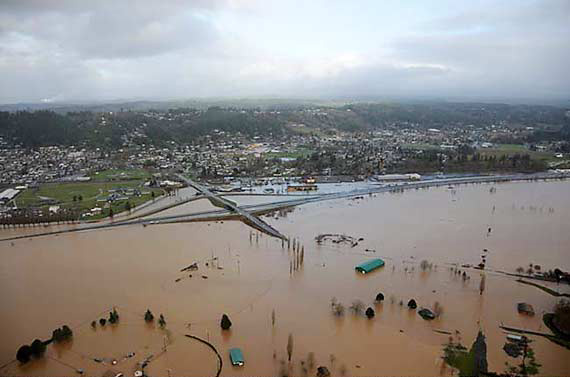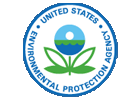
Flooding Chehalis, WA, on I-5 corridor. State Stormwater regulations work to alleviate stresses of high level storm events that can cause major flooding. These events represent only 1% of the rainfall in our state, yet do the most significant damage.
This editorial was published by the Columbian newspaper:
Sunday, December 14, 2008
By Dvija Bertish, Rosemere Neighborhood Association and Lauren Goldberg, Toxics and Conservation Director, Columbia Riverkeeper
The recent story regarding the City of Vancouver’s move to increase protections for our local creeks and rivers from the stormwater that carries thousands of pounds of heavy metals, pesticides, and oil from city streets should be welcome news to everyone who values clean water, salmon or the chance for your family to enjoy a swim in a local river or lake.
Contrary to claims from the construction industry lobbyists, re-thinking how the City and county manages stormwater pollution is not cost prohibitive. Numerous studies show that planning for stormwater infiltration, bio-swales, and low impact development can often be significantly less expensive than the costly piping infrastructure cities used for over 50 years to deal with stormwater.
Untreated municipal stormwater is a major source of contamination for our local waterbodies, from the Columbia River to Vancouver Lake. The vast majority of rivers and lakes in our state fail to meet basic state water quality standards for pollutants such as toxics and bacteria. When rain sends runoff across city streets, construction projects, and industrial facilities, the water picks up contaminates that get drained into local streams, such as Burnt Bridge and Salmon Creeks. These toxics accumulate in local fish, wildlife and birds.
When fish and shellfish are caught, the toxics are transferred to someone’s dinner plate. Simply put, the impacts of stormwater pollution are a public health issue with particular impacts on low income residents that regularly use the Columbia and other local waterbodies as a food sources for their families.
In addition, surface water and the groundwater in our community are hydrologically connected. In turn, stormwater pollution also puts our drinking water at risk. Most of Clark County is almost entirely dependent upon groundwater as the sole source of our municipal water supply. In fact, the federal government gave our groundwater unique federal protection as a “Sole Source Aquifer.” This designation highlights EPA’s recognition that our drinking supply is vulnerable to contamination and is the only source of potable water available.
Despite claims from those who want the status quo at any cost, multiple studies show that re-thinking the way cities manage stormwater pollution can actually cost less than the expensive engineering, piping and related infrastructure. Planning a parking lot to drain to a bio-swale where stormwater can filter back into the aquifer, for example, can be significantly less expensive than sending a major pipe from the parking lot to a local creek. Detaching household gutters from a city sewage system and letting rainwater percolate into landscaping can reduce the volume of waste a city sewage plant has to manage and decrease treatment plant costs.
To successfully address stormwater pollution it will take focused efforts on the part of the City, county and the public. Given the known threats of stormwater pollution in our community, Vancouver must be a leader in protecting human health and the environment. The next time you look at the oily sheen of water running down the gutter of a city street remember that there are real connections between stormwater and the water that feeds our taps. With that in mind and recognition of how seriously stormwater impacts our local streams and fish, the effort to decrease stormwater pollution should be a project that people from across the political spectrum can support.
Dvija Bertish, Rosemere Neighborhood Association
Lauren Goldberg, Toxics and Conservation Director, Columbia Riverkeeper










![Washington State Water Quality Assessment [303(d)] Washington State Department of Ecology](http://www.rosemerena.org/home/wp-content/uploads/2009/03/ecy_logo.gif)

